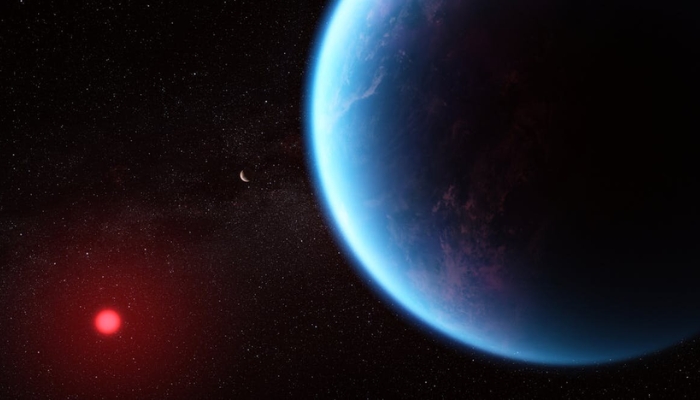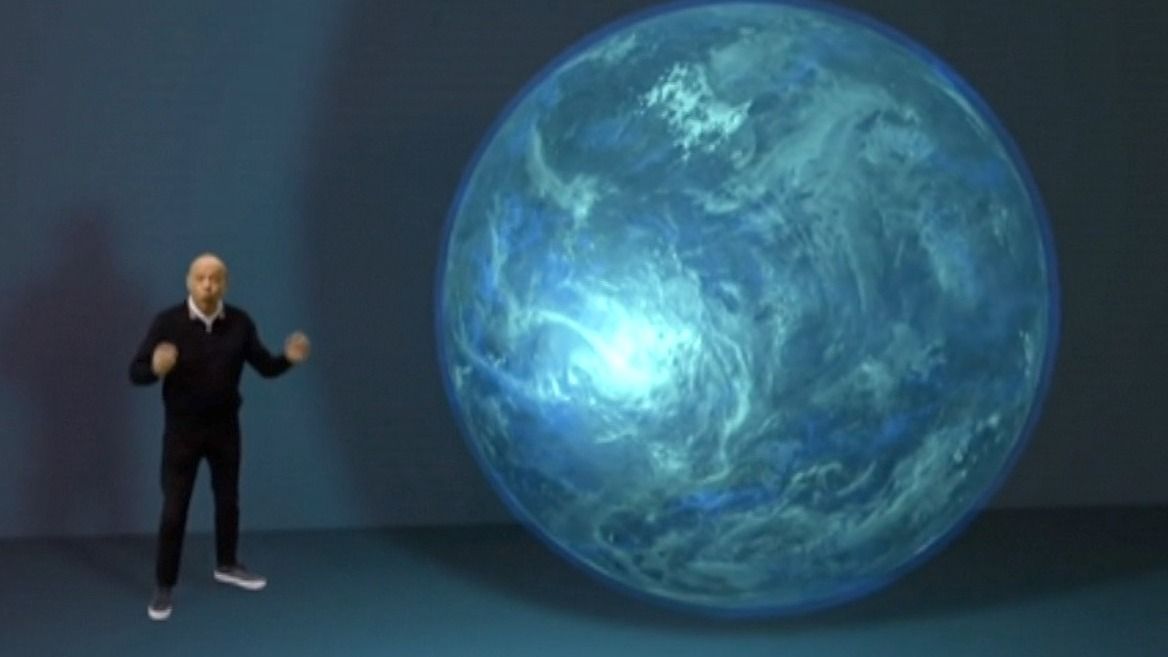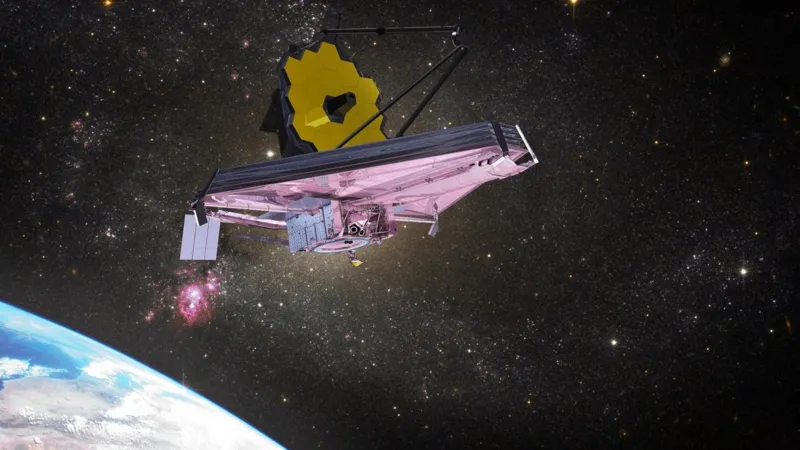"Scientists find strong signs of life on a faraway planet, bringing new hope in the search for life beyond Earth."

Distant planet with signs of life, glowing sky, and water surface.
"Scientists have found new, but uncertain, clues that a distant planet orbiting another star might have life."
"A team from Cambridge studying the atmosphere of a planet called K2-18b has found signs of molecules that, on Earth, are made only by simple living things."
"This is the second time, and a more hopeful one, that chemicals linked to life have been found in the planet's atmosphere by NASA’s James Webb Space Telescope (JWST)."
"However, the team and other astronomers say more information is needed to be sure about the findings."
"The lead researcher, Prof Nikku Madhusudhan, said at his lab at Cambridge University's Institute of Astronomy that he hopes to find solid proof soon."
"This is the best sign so far that there might be life beyond Earth. I believe we could confirm this signal in the next one or two years."

"K2-18b is about two-and-a-half times bigger than Earth and is 700 trillion miles away — that's 124 light years — much too far for humans to ever reach in a lifetime."
"The JWST is so powerful that it can study the planet's atmosphere by analyzing the light that passes through from the small red Sun it orbits."
"The Cambridge team has discovered that the atmosphere appears to have the chemical signs of at least one of two molecules linked to life: dimethyl sulphide (DMS) and dimethyl disulphide (DMDS). On Earth, these gases are produced by marine phytoplankton and bacteria."
"Prof Madhusudhan said he was surprised by how much gas seemed to be detected in just one observation."
"The amount of this gas in the atmosphere is estimated to be thousands of times greater than what we have on Earth," he said.
"So, if the link to life is confirmed, this planet could be full of life," he added.
Prof Madhusudhan went on: "If we confirm life on K2-18b, it would essentially prove that life is common throughout the galaxy."
He told BBC Radio 5Live on Thursday: "This is a crucial moment in science, and also really significant for us as a species."
"If there’s even one example, and with the universe being infinite, there's a chance that life exists on many more planets."
Dr. Subir Sarkar, an astrophysics lecturer at Cardiff University and a member of the research team, said the findings suggest that K2-18b might have an ocean that could potentially harbor life – though he warned that scientists "don’t know for certain."
He added that the research team will keep focusing on the search for life on other planets: "Stay tuned."
"At this stage, there are many uncertainties, as Prof Madhusudhan's team openly acknowledges."
"First of all, this recent detection doesn't meet the standard needed to declare it a discovery."
"To make that claim, the researchers need to be about 99.99999% certain their results are accurate and not just a random error. In scientific terms, this is known as a five sigma result."
"The latest results are only three sigma, or 99.7%, which may sound impressive but isn't enough to fully convince the scientific community. However, it's a significant improvement over the one sigma result of 68% the team got 18 months ago, which was met with a lot of skepticism at the time."
"Even if the Cambridge team achieves a five sigma result, it won't be definitive proof of life on the planet, according to Prof Catherine Heymans of Edinburgh University and Scotland's Astronomer Royal, who is not part of the research team."
"Even with that level of certainty, the question remains: what is the source of this gas?" she told BBC News.
"On Earth, it's produced by microorganisms in the ocean, but even with perfect data, we can't be certain that this gas comes from a biological source on an alien world. Many strange things happen in the universe, and we don't know what other geological processes on this planet might be creating these molecules."
"The Cambridge team shares this view. They are collaborating with other groups to test if DMS and DMDS can be produced through non-living processes in the lab."
"There's still a 0.3% chance that it could be a statistical error," Prof Madhusudhan said.
"The idea that life could exist on another planet is a huge claim, if it's true," he told BBC Radio 4's Today programme. "That's why we want to be extremely thorough, make more observations, and gather evidence to reduce the chance of it being a fluke to less than one in a million."
"He said this could be possible in 'perhaps one or two years'."
Other research groups have suggested alternative, non-living explanations for the data collected from K2-18b. There's a strong scientific debate not only about the presence of DMS and DMDS but also about the planet's composition.
Many researchers believe the planet has a vast liquid ocean because ammonia is absent from K2-18b's atmosphere. They think the ammonia might be absorbed by a large body of water beneath the surface.
However, it could also be explained by an ocean of molten rock, which would rule out the possibility of life, according to Prof Oliver Shorttle of Cambridge University.
"All our knowledge about planets orbiting other stars comes from the tiny amounts of light that pass through their atmospheres. So, it's an extremely faint signal we're trying to interpret, not only for signs of life but for everything else," he said.
"With K2-18b, part of the scientific debate still revolves around the planet's structure."
Dr. Nicolas Wogan at NASA's Ames Research Center offers a different interpretation of the data. He published research suggesting that K2-18b is a mini gas giant with no solid surface.
These alternative theories have also been questioned by other research groups, arguing that they don't align with the data from JWST, further intensifying the ongoing scientific debate around K2-18b.
Prof. Chris Lintott, host of BBC's The Sky at Night, expressed "great admiration" for Prof Madhusudhan's team but said he was approaching the research with caution.
"I think we need to be very cautious about calling this 'a moment' in the search for life. We've had similar moments before," he told Today.
He emphasized that the research should instead be viewed as "part of a vast effort to understand what's out there in the cosmos."
Prof Madhusudhan admits there's still a long way to go to answer one of the greatest questions in science, but he believes his team is heading in the right direction.
"Decades from now, we may look back at this point and realize it was when the idea of a living universe became within reach," he said.
"This could be the turning point, where the fundamental question of whether we're alone in the universe is one we can finally answer."
The research has been published in The Astrophysical Journal Letters.

Comments